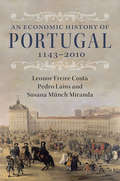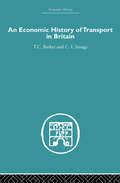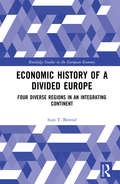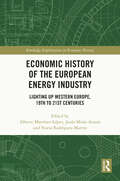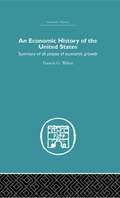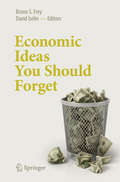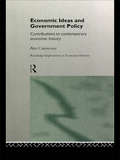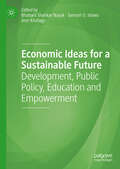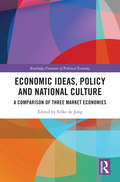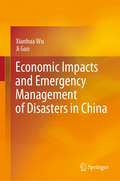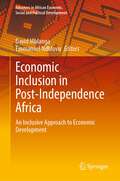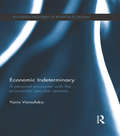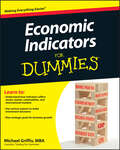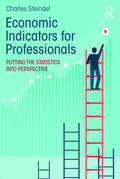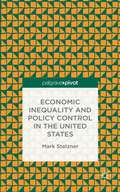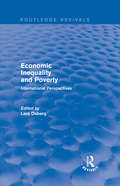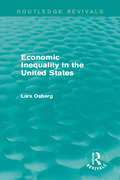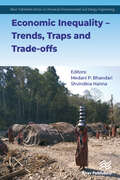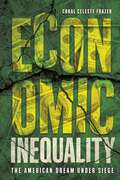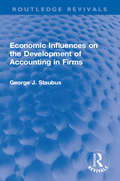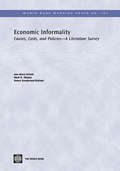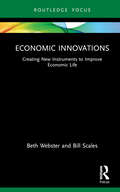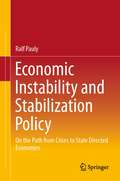- Table View
- List View
Economic History of Portugal, 1143–2010
by Pedro Lains Leonor Freire Costa Susana Münch MirandaThis book offers a fascinating exploration of the evolution of the Portuguese economy over the course of eight centuries, from the foundation of the kingdom in 1143, when political boundaries began to take shape in the midst of the Christian Reconquista of the Iberian Peninsula, and the formation of an empire, to the integration of the nation into the European Communities and the Economic and Monetary Union. Through six chapters, the authors provide a vibrant history of Portugal's past with a focus ranging from the medieval economy and the age of globalization, to war and recovery, the Atlantic economy, the rise of liberalism and patterns of convergence. The book provides a unique long-term perspective of change in a southern European country and its empire, which responds to the fundamental broader questions about when, how and why economies expand, stagnate or contract.
Economic History of Transport in Britain
by Christopher Savage T.C. BarkerPublished in 2005, Economic History of Transport Britain is a valuable contribution to the field of Economic History.
Economic History of Warfare and State Formation
by Jari Eloranta Eric Golson Andrei Markevich Nikolaus WolfThis edited volume represents the latest research on intersections of war, state formation, and political economy, i. e. , how conflicts have affected short- and long-run development of economies and the formation (or destruction) of states and their political economies. The contributors come from different fields of social and human sciencies, all featuring an interdisciplinary approach to the study of societal development. The types of big issues analyzed in this volume include the formation of European and non-European states in the early modern and modern period, the emergence of various forms of states and eventually modern democracies with extensive welfare states, the violent upheavals that influenced these processes, the persistence of dictatorships and non-democratic forms of government, and the arrival of total war and its consequences, especially in the context of twentieth-century world wars. One of the key themes is the dichotomy between democracies and dictatorships; namely, what were the origins of their emergence and evolution, why did some revolutions succeed and other fail, and why did democracies, on the whole, emerge victorious in the twentieth-century age of total wars? The contributions in this book are written with academic and non-academic audiences in mind, and both will find the broad themes discussed in this volume intuitive and useful.
Economic History of a Divided Europe: Four Diverse Regions in an Integrating Continent (Routledge Studies in the European Economy)
by Ivan T. BerendThis book presents the sharp regional diff erences within the integrating European continent. Four regions – Northwestern Europe, Southern Europe, Central Europe, and Eastern-Southeastern Europe – represent high, medium, and relatively less-developed levels of economic advancement. These disparities have emerged as a result of historical diff erences that produced and reinforced cultural and behavioral diff erences. The author examines the distinctions between the regions, looks at how these differences transpired and became so retrenched, and answers the question of why some countries were able to elevate to higher levels of economic development while others could not. This book is unique in that it provides a timely historical analysis of the main causes of the most pressing conflicts in Europe today. Readers will come away from this book with a deeper understanding of the sharp divergence in economic standing between the four different regions of Europe, as well as knowledge about how institutional corruption and other cultural features exacerbated these variations. The book also offers a better understanding of major European Union confl icts between member countries and between member and nonmember countries, as well as the rise of autocratic regimes in certain countries. The book begins with a short history of European integration throughout European civilization and then goes on to discuss the modern reality of integration and attempts to homogenize the Continent that divided into four different macro-regions. It will primarily appeal to scholars, researchers and students studying Europe from various fi elds, including economics, business, history, political science, and sociology, as well as a general readership interested in Europe’s past, present, and future.
Economic History of the European Energy Industry: Lighting up Western Europe, 19th to 21st centuries (Routledge Explorations in Economic History)
by Jesús Mirás-Araujo Alberte Martínez-López Nuria Rodríguez-MartínGlobal climate change and the war in Ukraine have put energy back on the agenda for Europe in a way that has not been seen since the oil crisis of the 1970s. But the economics and business of supplying energy to Europe has a long and rich history going back to the nineteenth century. This book explores changes in energy markets, strategies, firms and investments during the nineteenth and twentieth centuries. The primary focus is on manufactured gas—the gas that was initially produced from coal distillation until new ways of manufacturing gas emerged after the Second World War.The expert contributors to this volume draw on their extensive research and utilise primary sources to explore a wide range of issues, including technological adaptation, market regulation, energy investments (particularly the role of foreign capital), gas consumption and supply issues. The case studies are particularly drawn from Spain, France and Italy, but the authors provide a comparative and global perspective to consider the wider context. The volume closes with an epilogue that brings the story into the present day to consider current issues affecting gas markets in the EU, including war, geostrategy and pipelines.This book will be of interest to readers in economic history, business history, energy history, the history of public utilities and modern European history more broadly.
Economic History of the United States
by Francis G. WalettFirst Published in 2005. Routledge is an imprint of Taylor & Francis, an informa company.
Economic Ideas You Should Forget
by Bruno S. Frey David IselinReporting on cutting-edge advances in economics, this book presents a selection of commentaries that reveal the weaknesses of several core economics concepts. Economics is a vigorous and progressive science, which does not lose its force when particular parts of its theory are empirically invalidated; instead, they contribute to the accumulation of knowledge. By discussing problematic theoretical assumptions and drawing on the latest empirical research, the authors question specific hypotheses and reject major economic ideas from the "Coase Theorem" to "Say's Law" and "Bayesianism. " Many of these ideas remain prominent among politicians, economists and the general public. Yet, in the light of the financial crisis, they have lost both their relevance and supporting empirical evidence. This fascinating and thought-provoking collection of 71 short essays written by respected economists and social scientists from all over the world will appeal to anyone interested in scientific progress and the further development of economics.
Economic Ideas and Government Policy: Contributions to Contemporary Economic History (Routledge Explorations in Economic History)
by Sir Alec CairncrossThis volume collects together Sir Alec Cairncross' most important contributions to the economic history of the post-1939 period. They address such major issues as the role of economists in the 2nd World War, the significance of the Marshall plan and Britain's relative economic decline. Together they demonstrate a keen insight into the changing role of the economist in government and the gradual transformation of the economic landscape.
Economic Ideas for a Sustainable Future: Development, Public Policy, Education and Empowerment
by Samuel O. Idowu Amr Khafagy Bhabani Shankar NayakThis volume examines the concept of economic sustainability through the everyday practices of education, production, distribution, consumption, economic development, and public policy. It explores the economic systems and processes shaped by capitalism and how commodification has led to uneven and unsustainable development. Particular attention is given to how ideas of sustainability are constructed through education and how, without a critique of capitalism, these discussions often overlook the exploitation and commodification of both nature and human beings. This book advocates for a new paradigm based on socio-ecological transition that places sustainability and equity at the core of economic development and the political economy. It will be valuable to students and researchers interested in public policy, sustainable development, and the political economy.
Economic Ideas in Political Time
by Widmaier Wesley W.Over the past century, the rise and fall of economic policy orders has been shaped by a paradox, as intellectual and institutional stability have repeatedly caused market instability and crisis. To highlight such dynamics, this volume offers a theory of economic ideas in political time. The author counters paradigmatic and institutionalist views of ideas as enabling self-reinforcing path dependencies, offering an alternative social psychological argument that ideas which initially reduce uncertainty can subsequently fuel misplaced certainty and crises. Historically, the book then traces the development and decline of the progressive, Keynesian, and neoliberal orders, arguing that each order's principled foundations were gradually displaced by macroeconomic models that obscured new causes of the Great Depression, Great Stagflation, and Global Financial Crisis. Finally, in policy terms, Widmaier stresses the costs of intellectual autonomy, as efforts to 'prevent the last crisis' have repeatedly obscured new causes of crises.
Economic Ideas, Policy and National Culture: A Comparison of Three Market Economies (Routledge Frontiers of Political Economy)
by Eelke De JongAll human beings develop a certain view on the world, and individuals belonging to the same national cultures are likely to develop very similar views with one another. In this same manner, academic economists and policymakers are consistently exposed to the same view on the preferred way of organizing an economy as the rest of the population of their given country. This book explores the economic impacts of these shared cultural values, focusing on the wider economies of the USA, Germany, and France. These three countries represent broadly different types of economic organization and their corresponding economic ideologies: a free market economy, a coordinated market economy, and a hierarchical market economy. The contributors to this edited volume work to examine the extent to which the shared worldviews between academic economists, policymakers, the wider population, and the tradition of each economic thought in which the economy fits, impacts these economies. In particular, the chapters look at the design of the labor market, the financial system, competition policy, and monetary policy. The work also explores the extent to which the shared views on national culture and economic systems and policies in these countries contribute to the population’s well-being overall. This book makes an invaluable contribution to the literature on comparative economics, economic policy, well-being and cultural economics.
Economic Impacts and Emergency Management of Disasters in China
by Xianhua Wu Ji GuoThis book uses cutting-edge methods, such as big data mining methods on social media, generalized difference in difference, inoperational input–output models, improved data envelopment analysis, improved computable general equilibrium and others to calculate the economic impacts of climate and environmental disasters on China. This book provides the ideas, methods and cases of the redistribution of air pollution emissions in China through evaluating the benefits of meteorological disaster services and meteorological financial insurance. Using big data resources and data mining methods, as well as econometric models, etc., this book provides a comprehensive assessment of the economic impact of disasters in China and studies China's counterpart aid policy and international aid policy for disasters. This book is an academic monograph devoted to the China’s case study. The intended readership includes academics, government officials, graduate students and people concerned about China.
Economic Inclusion in Post-Independence Africa: An Inclusive Approach to Economic Development (Advances in African Economic, Social and Political Development)
by David Mhlanga Emmanuel NdhlovuThe second in a three-volume series, this edited volume discusses post-independence economic inclusion in selected African countries. While human development indices rise and poverty rates fall across the African continent, facilitated by recent technological and innovation development which reaches previously inaccessible regions, indicators continue to lag in several crucial areas. Economic and social inclusion, therefore, remains at the forefront of development discussions across the continent. Using a variety of case studies underpinned by multidisciplinary research approaches, the chapters in this book explore a wide range of economic and financial inclusion issues from all aspects; from benefits and challenges to the steps that need to be taken to improve the level of economic inclusion on the continent. Governments, development agencies, non-governmental organizations with a bias toward development, students, and university lecturers will all find this book interesting.
Economic Indeterminacy: A personal encounter with the economists' peculiar nemesis (Routledge Frontiers of Political Economy)
by Yanis VaroufakisThis volume is a collection of some of the best and most influential work of Yanis Varoufakis. The chapters all address the issue of economic indeterminacy, and the place of a socialized Homo Economicus within the economy. The book addresses Varoufakis’ key interpretation regarding the way in which neoclassical economics deals with the twin problems of complexity and indeterminacy. He argues that all neoclassical modelling revolves around three meta-axioms: Methodological individualism, Methodological instrumentalism and the Methodological Imposition of Equilibrium. Each chapter is preceded by an introduction, which explains its place within the overarching theme of the book. The volume also includes a lengthy introduction, plus a concluding chapter focusing on the future of economics. It will be a key work for all students and researchers in the field of political economy and economic methodology.
Economic Indicators For Dummies
by Michael GriffisEverything you need to easily get a handle on economic indicatorsIn today's volatile, often troubling economic landscape, there are myriad statistics and reports that paint an economic picture that can sometimes resemble a work by Jackson Pollock. These complex and often-conflicting reports could vex even the savviest investor. Economic Indicators For Dummies explains how to interpret and use key global economic indicators to make solid investments, aid in business planning, and help develop informed decisions. In plain English, it breaks down the complex language and statistics to help you make sense of this critical information. You'll discover how to interpret economic data within the context of other sometimes-conflicting reports and statistics, and use the information to make profitable decisions. You'll understand the meaning of such data as employment indices and housing and construction stats and how they affect stocks, bonds, commodities and international markets . . . and how you can use these statistics to make investment decisions as well as plan strategic goals for business growth. Economic Indicators For Dummies breaks down dozens of statistics and patterns to give you a better understanding of how various sources of data and information can be used. Breaks down jargon and statistical conceptsCovers how to use publicly available economic indicators to better position your portfolio, improve returns, and make sensible, long-range business plansDiscusses the reliability and timeliness of the collected data, while helping investors prioritize the flow of economic information to avoid information overloadWhether you're an investor, economics student, or business professional involved in making key strategic decisions for your company, Economic Indicators For Dummies has you covered.
Economic Indicators for Professionals: Putting the Statistics into Perspective
by Charles SteindelWe are bombarded with economic numbers: unemployment, retail sales, inflation, GDP—the list goes on and on. Some analyst or another is constantly telling us about an obscure statistic that is the key to our future, or is apparently the indicator that the "Fed" will be using to key off its decisions. With economic numbers playing such a central role in the national and world dialogue on policy and markets, and spilling over into the political arena, a broad review of what they are all about is timely. This book reviews the critical US economic data, and how one may put the numbers into an intellectual structure that will depict evolving economic reality. The work is aimed at those who want and need to get some understanding about how the data contributes to a big picture of the economy and guides policy. The objective is for the reader to grasp the overall logic of the data—how each piece of the puzzle contributes to our understanding of the overall economy. This is the way the Fed looks at the numbers. There are other books that go through the economic numbers, but they do so in a "bottom-up" fashion, describing a series in some detail and adding something about how financial markets may respond to it. This book naturally has considerable discussion of series, but views them as part of the overall mosaic, not items of fundamental interest in themselves.
Economic Inequality And Policy Control In The United States
by Mark StelznerIn Economic Inequality and Policy Control in the United States, Stelzner explores the causes of the astronomical increase in wage income inequality over the last three and a half decades.
Economic Inequality and Poverty: International Perspectives (Routledge Revivals Ser.)
by Lars OsbergThis title was first published in 1991: This collection focuses on the concepts and measurements of inequality, poverty, the concentration of wealth, and the implications of these issues for social policies. A special feature of this work is the international comparisons of the evidence on economic inequality.
Economic Inequality in the United States (Routledge Revivals)
by Lars OsbergOriginally published in 1984, this study explores multiple theoretical perspectives as well as critically analysing the most recent evidence at the time to try and find a full explanation for inequality in the United States. Arguments of neoclassical economists and Marxist and institutional structuralists are considered by Osberg as well as putting forward his own model. Osberg uses his findings to attempt a complete explanation of the issue and advises on policies which could be undertaken by the government to try and lessen the gap. This title will be of interest to students of Economics.
Economic Inequality – Trends, Traps and Trade-offs (River Publishers Series In Chemical, Environmental, And Energy Engineering Ser.)
by Medani P. Bhandari Shvindina HannaThe book “Economic Inequality – Trends, Traps and Trade-offs” presents the unexplored issues of economic inequality, including case studies of various countries. Inequality is a chronic divisive factor of society. It is well known that inequalities (such as economic, social, cultural, religious, geographical, etc.) have been omnipresent in human society. Inequalities can be found within each family, each community, and each nation and thus globally. Inequality is a major cause of political, economic, social instability, and creates crisis and conflict within society. A major cause of inequality is unequal, uneven, biased, power centric distributions of human economic, social, political, cultural and spiritual human necessities.The edited book examines the major parameters of the socio-economic issues of inequality and focuses on the key economic issues of inequality, namely, income and wealth distribution, equity & equality of outcome, and equality of opportunities. Economic inequality is measured by wealth, income dsiproportions in distribution and consumption patterns in a specific area. Mostly, inequality is measured using various statistical tools including the Gini Coefficient, inequality adjusted human development index, 20:20 ratio, Palma ratio, Hoover index, Galt score, Coefficient of variation, Theil index, wage share etc. However, not all income can be measured by these tools. By using case studies, this book encourages us to reframe economic development through the lens of growing inequalities and disparities. Economic growth per se is disproportional, and the efforts of scholars, practitioners and policymakers should be directed to empower the marginalized of society in a way that ‘no one should left behind’ (UN Slogan).
Economic Inequality: The American Dream under Siege
by Coral Celeste FrazerMillions of Americans don't earn enough money to pay for decent housing, food, health care, and education. Increasingly, families and young people aren't doing better than their parents and grandparents before them. In fact, they're doing worse. And women and minorities earn less than white men. The American Dream is harder to achieve than ever before. Meanwhile, the rich keep getting richer. Many Americans are angry about economic inequality, and many are working on solutions. Readers will learn how state and local governments, businesses, and ordinary citizens—including young people—are fighting to close the gap between rich and poor, to preserve the promises of American democracy, and to give everyone a fair shot at the American Dream.
Economic Influences on the Development of Accounting in Firms (Routledge Revivals)
by George J. StaubusA view of accounting as a practical activity – a service function whose value depends on its adaptation to the environment in which it serves – is a good place to start this book, originally published in 1996. While arts such as music and drama can be said to serve human needs, their development presumably cannot be explained primarily by reference to the economic features of their environments. By contrast, an economic service function such as accounting develops in response to economic features of its environment. The objective of this book is to stimulate interest in explaining the development of specific features of accounting as we know it in the firms that are so important to the economies of Western industrialized countries by reference to the economic features of those firms. The emphasis in this work is on the influence of economic features of the firm in the development of accounting.
Economic Informality: Causes, Costs, and Policies
by Ana Maria Oviedo Kamer Karakurum-Özdemir Mark R. ThomasThis survey assembles recent theoretical and empirical advances in the literature on economic informality and analyzes the causes and costs of informality in developed and developing economies. Using recent evidence, the survey discusses the nature and roots of informal economic activity across countries, distinguishing between informality as the result of "exclusion" and "exit." The survey provides an extensive review of recent international experience with policies aimed at reducing informality, in particular, policies that facilitate the formalization process, create a framework for the transition from informality to formality, lend support to newly created firms, reduce or eliminate inconsistencies across regulation and government agencies, increase information flows, and increase enforcement.
Economic Innovations: Creating New Instruments to Improve Economic Life (Routledge Focus on Economics and Finance)
by Beth Webster Bill ScalesThis book is a series of vignettes about changes to Australian institutions, organisations and systems that have significantly improved economic and social well-being for Australians. Economic system innovations have had a profound impact on our lives, from the invention of banking in the middle ages to the organisations established by the United Nations post-WWII. However, their intangible nature means that few people identify these changes alongside physical inventions. Although invention is normally an incremental process, with copying and adaption being the norm, the authors focus on reforms that were principally new to the world at the time of implementation. The book is not about the reforms and how well they worked, per se, rather about the people and the political struggle to get them adopted. The authors have chosen to focus on the stories where Australia has either taken a global leadership role or made a considerable advance in a particular new institution. What these stories show is that leadership in institutional innovation can come from many quarters: academia, the community, politics and the bureaucracy. Often the most successful teams combine people from all quarters albeit with support from the fourth estate. The work shows how many reforms began with modest beginnings, often an ordinary person with a vision, and how it takes several attempts to get change accepted. This key volume can be used to teach students of economics, political economy and politics. It illustrates the type of networks, actions and advocacy that is needed to get reform started and implemented and is written in a style to engage policy and think-tank audiences.
Economic Instability and Stabilization Policy: On the Path from Crises to State Directed Economies
by Ralf PaulyThis book pleads for a new orientation of government economic policy, as well as central bank policy, rejecting the traditional government stabilization policy that leads to a dead-end of economic instability and social inequality in the long run.Growing economic instability and increasing state stabilization characterize the development of the capitalist market economy since the major world economic crises of the last century. The book examines these crises and the measures states take to overcome them. Additionally, it addresses the effectiveness and consequences of state intervention. In presenting the main features of Keynes’ and Minsky’s macroeconomics, the book provides a conceptual basis for an outlook on government stabilization in a changing market economy. It thus also offers a suitable framework for current economic policy discussions. Finally, the book examines the wider context of economic history for lessons to be learned.This book is a must-read for scholars and students of economics, as well as policy-makers and practitioners, interested in a better understanding of macroeconomics, central bank policy, and the results of state intervention.
